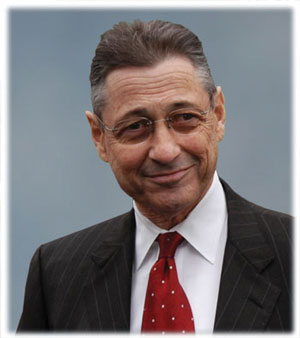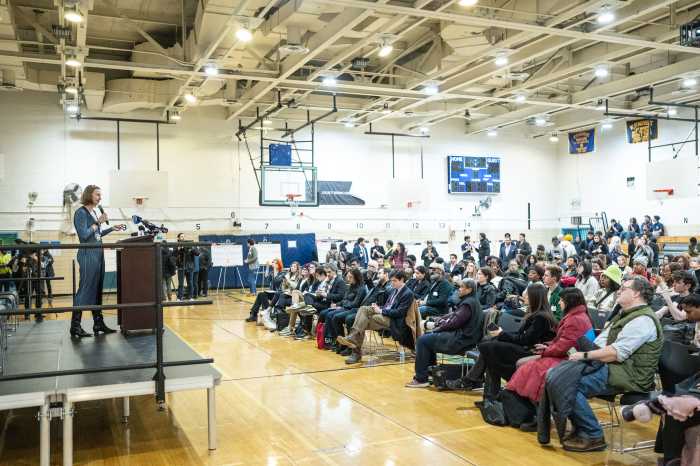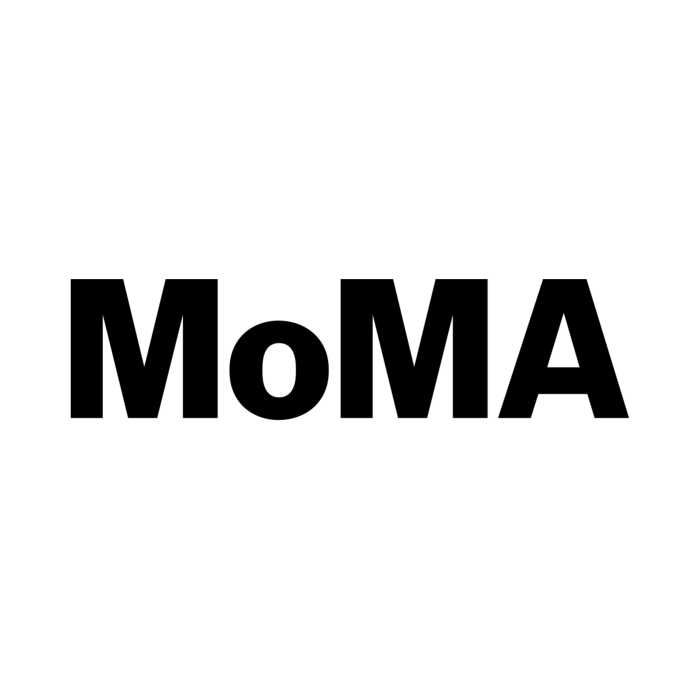
BY LINCOLN ANDERSON | Sheldon Silver, the powerful, longtime leader of the New York State Assembly, is the focus of a federal investigation, The New York Times reported in its lead article on Page One on Tuesday.
According to the Times, prosecutors from the office of Preet Bharara, the U.S. attorney for the Southern District of New York, are investigating “substantial payments” made to Silver by a small firm that specializes in seeking tax reductions for commercial and residential properties in New York City.
Prosecutors from Bharara’s office, along with F.B.I. agents, have allegedly found that Goldberg & Iryami, P.C. — a two-person firm — has paid Silver the sums roughly over a decade, but that he did not list this income on his annual financial disclosure forms, as required.
The payments were not made to Silver as campaign contributions, but as outside income as part of his private law practice. In addition to being the Assembly speaker, Silver is a personal-injury lawyer with the firm of Weitz and Luxenberg.
The U.S. attorney and F.B.I. reportedly are now trying to determine exactly what work Silver did in order to receive the payments.
A spokesperson for the U.S. Attorney’s Office declined to comment on the investigation — and would not confirm or deny to The Villager if there even is an investigation. No one has even been charged yet, the spokesperson noted.
Silver’s spokesperson did not respond by press time to a request for comment.
Meanwhile, in a confusing twist, the New York Post reported that the sum Silver received from Goldberg & Iryami was “not substantial.”
The Post may have gotten this mixed up with the campaign donations that the firm has given to Silver. Since 2001, the firm has reportedly made six donations to him, totaling $7,600.
New York State legislators are allowed to hold outside jobs, which are described as “part-time,” but which often pull in income far in excess of their government paychecks. Good-government groups have long criticized this situation for creating the potential for conflicts of interest and payoffs.
In Silver’s case, his salary as speaker is $121,000 while his outside income as a private attorney was more than $650,000, according to what he reported in 2013.
The federal probe stems from the Moreland Commission, the anti-corruption panel that Governor Andrew Cuomo created in 2013 but then abruptly terminated this March.
Legislators had challenged the commission’s investigation into details of their outside income.
According to the Times, Silver “is not known to have any expertise in the complex and highly specialized area of the law in which Goldberg & Iryami practices, known as tax certiorari, which involves challenging real estate tax assessments and seeking reductions from municipalities.”
In addition, the Times reported of Silver, “He has long listed the personal injury firm Weitz & Luxenberg on his financial disclosure forms. Still, almost nothing is known about his role at the firm.”
Goldberg & Iryami has represented “a sizable number of properties on the Lower East Side,” seeking real estate tax reductions for them, the Times reported. These include large co-op complexes, including Hillman Housing Corporation, on Grand St., in which Silver lives.
Goldberg & Iryami has also represented the neighboring East River Housing Corporation, according to records. Both the Hillman and East River complexes are managed by Harold “Heshy” Jacob, a close Silver ally.
A recent letter from Gary Altman, the East River board president, to shareholders, the Times reported, noted that its “tax certiorari firm” — unnamed in the letter — had successfully reduced the complex’s taxes. Jacob, in a 2009 letter to shareholders, noted that the city had raised East River’s assessment to $28 million, and that its tax certiorari lawyer “was very successful in reducing what could have been a $3,000,000 increase to a $750,000 increase” in taxes.
Jacob told the Times that the firm and a predecessor firm, Jay Arthur Goldberg, P.C., had been seeking tax reductions for the developments since Jacob began managing them, more than 25 years ago.
Jacob admitted that he knew Jay Goldberg from growing up in the neighborhood together, but that the legal work for the developments is bid out competitively.
Tax certiorari lawyers get paid roughly one-third of any reduction they obtain, but Jacob told the Times Goldberg has been paid “substantially less.”
In a Times article last month on Silver and his outside income, a Silver spokesperson commented of the Assembly speaker, “None of his clients have any business before the state.”
Currently, state ethics laws do not require legislators to disclose details about their outside work or who their clients are.
Several local politicos did not respond to requests for comment for this article, including Assemblymembers Deborah Glick and Richard Gottfried and District Leader Paul Newell. District Leader Jenifer Rajkumar responded but declined to comment.
One elected official who did deign to comment about the powerful speaker was District Leader Arthur Schwartz.
“I have problems with legislators getting paid for work when they don’t do work,” Schwartz said. “It’s an easy way to pass a bribe. … I am curious to see to see what tax certiorari work Speaker Silver did. Very curious.”
Silver has been the Assembly speaker since 1994. Most recently, his leadership took a major hit during the Vito Lopez scandal, in which it was revealed that Silver arranged for hush money to be paid to two female staffers who said they were sexually harassed by the powerful Brooklyn Democratic leader. Two other female Lopez staffers who said they were also sexually harassed subsequently sued, charging that the secret $103,000 settlement — using taxpayer funds — merely allowed Lopez to continue his abuse.
Silver was recently set to testify in the two women’s federal lawsuit against Lopez, but his deposition was delayed, which the Daily New reported, suggests that a settlement may be looming. The state has already spent $1 million in taxpayer funds to defend the disgraced Lopez.




































